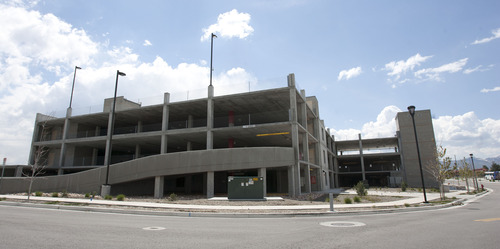This is an archived article that was published on sltrib.com in 2014, and information in the article may be outdated. It is provided only for personal research purposes and may not be reprinted.
Besides running trains and buses, the Utah Transit Authority could soon become more involved in real estate development, too — which has led to controversy in the past.
The Senate moved in that direction Tuesday by voting 20-2 to give preliminary approval to SB51. It will face a final Senate vote likely later this week before going to the House.
Sen. Jerry Stevenson, R-Layton, sponsor of the bill, said it would allow UTA to become involved in five more "transit-oriented developments," designed to build housing, retail stores and offices near transit stations to improve ridership. UTA could choose specific projects later.
The UTA received legislative permission five years ago to be involved in five earlier projects, Stevenson said, which it chose to develop in Sandy, Clearfield, Sugar House, a TRAX station at 3900 South, and at the Jordan Valley TRAX Station in West Jordan.
Stevenson said the opportunity comes because when UTA purchased property to build or expand its FrontRunner and TRAX rail lines, it ended up with some large unused parcels near the tracks.
"If they sell the property, then the money goes to Washington, D.C., because the property was purchased with federal funds," Stevenson said.
Instead, the agency hopes to partner with developers to build on that land. "The federal government encourages them to do transit-oriented developments that put more people at transit lines," and helps reduce pollution, Stevenson said.
Sen. Wayne Harper, R-Taylorsville, complained that the bill "enhances the reach of a quasi-governmental entity … to co-develop and compete with private development."
Developments have sometimes been controversial.
One at the Jordan Valley TRAX station included building two large parking garages for $15.6 million. The structures have sat largely unused for years. One even has chains across its entrances to keep it closed. However, UTA says they will be needed for development planned there, and for projected future ridership.
In another controversy, developer Terry Diehl was pressured to resign from the UTA board when he sought possibly to be involved in such developments. Other board members waived a one-year ban on Diehl participating in such projects when he did step down.
That came after a legislative audit asserted Diehl broke the law by misusing official information about the location of a potential commuter rail station in Draper by buying rights to develop land around it. Diehl denied any wrongdoing.
The issue of such developments also came up last week in a hearing that approved a bill that could allow voters to decide whether to impose a quarter-cent increase in sales tax to expand UTA services, with several people seeking to ensure such money could not go to such developments.
"We'd love to see UTA focus on being a good bus company rather than a railroad corporation or a real-estate development powerhouse," Steve Erickson, representing the Crossroads Urban Center that serves the poor, said in the hearing,



